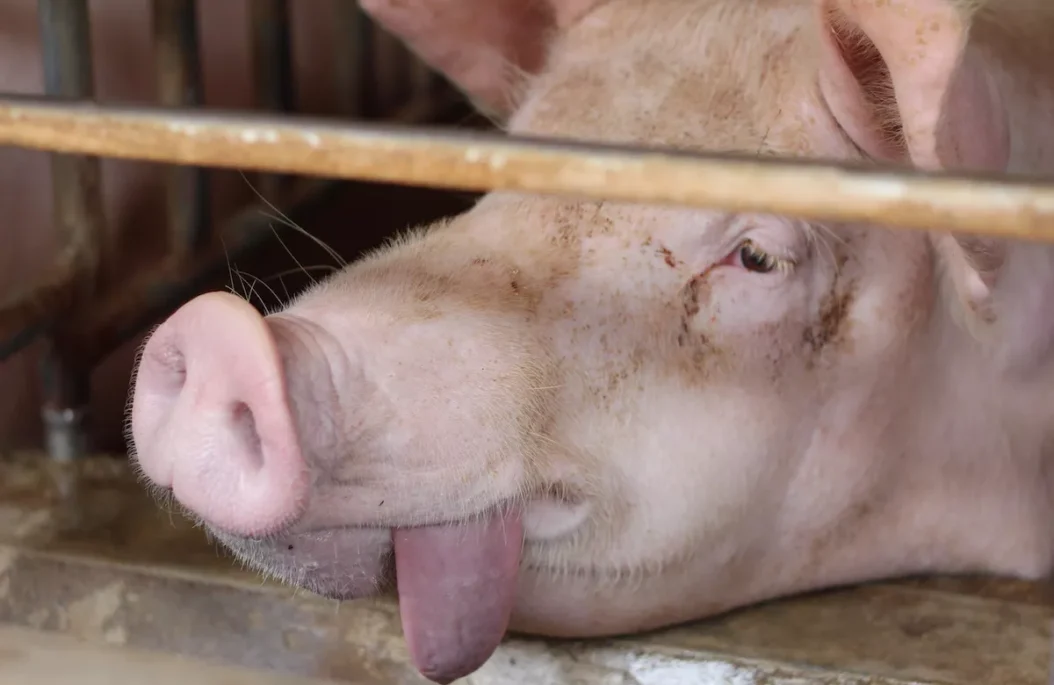Voter-approved anti-gestation crate policies on hold as SCOTUS decision looms on authority of states to restrict pork sales that meet humane and food-safety standards
Washington, D.C. – Animal welfare groups and farmers applauded the introduction of the Pigs in Gestation Stalls (PIGS) Act, H.R. 2939, to ban the extreme confinement of mother pigs in gestation crates. That bill was introduced by Rep. Veronica Escobar, D-Texas. Reps. Nanette Barragan, D-Calif., Eleanor Holmes-Norton, D-D.C., and Joe Neguse, D-Colo., are original cosponsors.
Breeding pigs may spend up to three years intensively confined in a crate barely larger than the animal, resulting in extreme physical and psychological torment. The sow may weigh 300-600 pounds, and the 2-by-7 crate immobilizes her, inhibiting her from even turning around or taking more than half step. Pigs raised for meat are not kept in these restrictive crates.

“Animals born and built to move and to turn around should at least be allowed to do so,”said Jim Keen, D.V.M. director of veterinary sciences for the Center for a Humane Economy. “Confining sows in crates that immobilize them is demonstrably inhumane and there are widely accepted and applied alternative housing methods. We applaud Rep. Escobar for her work to ensure that all animals are treated more humanely.” Dr. Keen served on the faculty at the University of Nebraska College of Veterinary Medicine and also worked for USDA for 20 years at the National Meat Animal Research Center.
“A national policy against gestation crates levels the playing field for all producers, retailers, and consumers, providing certainty and consistency for all stakeholders,” said Thomas Pool, senior veterinarian with Animal Wellness Action. “Keeping a sow in a two-foot-wide crate is akin to stuffing a large-bodied animal in a tiny little closet and never letting her out.” A retired Colonel in the U.S. Army, Dr. Pool grew up on a cattle ranch outside of Lawton, Okla. and served as the commander of the Army Veterinary Corps.
Almost every major food retailer in the United States – from McDonald’s to Costco to Aramark – has made a pledge to phase out sourcing pork from factory farms that confine sows in gestation crates, with most pledges originally set to take effect in 2022. Voters have approved all five ballot measures in four states to ban the use of gestation crates in Arizona (2006), California (two separate ballot initiatives in 2008 and 2018), Florida (2002), and Massachusetts (2016). Major pig-producing states, including Colorado, Michigan, and Ohio, are phasing out gestation crates by law.
Dr. Keen and Dr. Pool submitted a brief to SCOTUS in the challenge to Proposition 12 by the National Pork Producers Council and the American Farm Bureau Federation. Two AWA attorneys break down the Prop 12 case here. AWA and the Center also submitted a separate brief in the case. Read more on the briefs here.
“Pigs are sentient beings that feel pain and suffering. They are sensitive, gentle, and smart creatures that are treated with incredible cruelty before they are sent to be slaughtered,” said Congresswoman Veronica Escobar, D-Tex. “While there is much more work needed to reform the cruelty in our food industry, this is an important step in holding the swine industry accountable by limiting the horrific conditions pregnant pigs are kept in.”
The pork industry’s legal effort, NPPC v. Ross, is a direct challenge to Prop 12, but its effect would be the same for a far larger number of state laws and regulations that restrict in-state sales of pork and eggs that come from factory farms that severely confine the animals.
“Since inception, and for more than a quarter century, Niman Ranch has shunned the idea of keeping pigs in cages so small they can’t even turn around,” said Paul Willis, Niman Ranch’s founding hog farmer, based in north central Iowa. “We have over 600 hog farmers in our network today whose high welfare husbandry practices line up with the values of the vast majority of American consumers. That contrasts with factory farms where customary animal-rearing practices would shock people if they got an up-close view of what these smart, sociable animals endure.”
“It’s not just California that has banned gestation crates,” said Annie Harvilicz, D.V.M., president of the Animal Wellness Foundation. “So have nine other states, the European Union, and more than 60 of the biggest food retailers in the U.S.”
“All animals, livestock included, deserve to have the opportunity to express their instinctive behavior,” said Will Harris, owner and proprietor of White Oak Pastures and former Small Businessperson of the Year. “It is the responsibility of the stockman to provide an environment in which this is possible. Hogs were meant to root and wallow. Depriving them of this instinct is stressful to the hog, and a cruelty on the part of the hog producer. At the very least, they should not be immobilized.”
“We must move past the era of immobilizing animals for years on end as a customary animal-rearing strategy,” added Wayne Pacelle, president of Animal Wellness Action, and senior vice-president at the Center for a Humane Economy. “Immobilization is a form of punishment and torment, not a responsible way to raise animals.”

